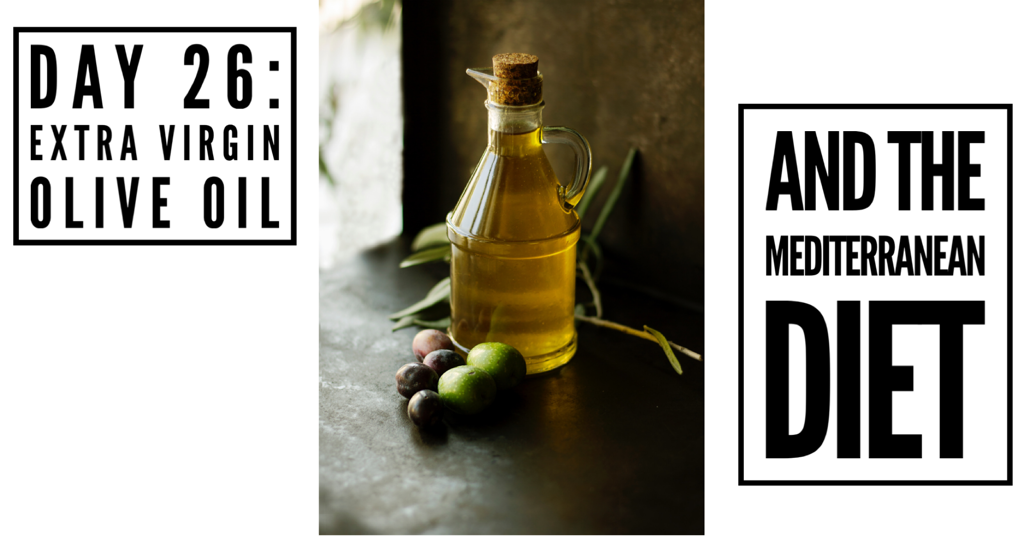Day 26: Extra Virgin Olive Oil and The Mediterranean Diet
When it comes to fat, there is no doubt that extra virgin olive oil (EVOO) and its consumption is the best option. Many studies have proven its beneficial role in cardiovascular health. And when you scrutinize the Mediterranean Diet, most recipes would use extra virgin olive oil not just to cook the dishes but to garnish the final product with a healthy drizzle of EVOO.
Studies have shown that the consumption of extra virgin olive oil is associated with an anti-atherosclerotic potential possibly related to its anti-inflammatory effect and anti-oxidant role. This is attributed to the polyphenols, tocopherols, and other phenolic compounds that are richly-present in EVOO.
So how can we consume more of this healthy oil and incorporate it in our diet?
Personally, I have used EVOO to impart fattiness in my dishes because I have eliminated meat in my cooking.
For example, adobo is a popular dish in the Philippines. Every region has a different version. The essential flavoring ingredients remain the same: soy sauce, vinegar, bay leaf and pepper corn. From here, the cooking road can branch into many ways depending on the ratio and proportion of soy sauce and vinegar, the choice of meat or protein, and the addition of other spices like ginger and ingredients like coconut milk.
The original version of adobo includes a fatty cut of pork or chicken. The fat from the meat is so rich and thick, you could see the stew brimming with the oil from the meat cuts. This makes it a “deadly” dish. If one uses a lean cut like pork tenderloin and skinless chicken breast, the meat will end up with a dry texture.
My culinary adventure has led me to the vegetarian road that uses young jackfruit to mimic the shredded meat texture, porcini and Shiitake mushrooms for the umami punch, and soy curls for the protein component. Drizzling with extra virgin olive oil gives this vegetarian dish the rich finish that it needs to replicate the traditional fatty cuisine.
With extra virgin olive oil and these meat substitutes, I’m able to cook healthier versions of traditional Filipino dishes.
A famous chef once said, “Anyone can cook meat. Leave the vegetables to the professionals.”
But I’d rather have everyone cook vegetables and cook them well.
Plant is medicine but it doesn’t have to be bitter and unpalatable.
Studies have shown that the consumption of extra virgin olive oil is associated with an anti-atherosclerotic potential possibly related to its anti-inflammatory effect and anti-oxidant role. This is attributed to the polyphenols, tocopherols, and other phenolic compounds that are richly-present in EVOO.
So how can we consume more of this healthy oil and incorporate it in our diet?
Personally, I have used EVOO to impart fattiness in my dishes because I have eliminated meat in my cooking.
For example, adobo is a popular dish in the Philippines. Every region has a different version. The essential flavoring ingredients remain the same: soy sauce, vinegar, bay leaf and pepper corn. From here, the cooking road can branch into many ways depending on the ratio and proportion of soy sauce and vinegar, the choice of meat or protein, and the addition of other spices like ginger and ingredients like coconut milk.
The original version of adobo includes a fatty cut of pork or chicken. The fat from the meat is so rich and thick, you could see the stew brimming with the oil from the meat cuts. This makes it a “deadly” dish. If one uses a lean cut like pork tenderloin and skinless chicken breast, the meat will end up with a dry texture.
My culinary adventure has led me to the vegetarian road that uses young jackfruit to mimic the shredded meat texture, porcini and Shiitake mushrooms for the umami punch, and soy curls for the protein component. Drizzling with extra virgin olive oil gives this vegetarian dish the rich finish that it needs to replicate the traditional fatty cuisine.
With extra virgin olive oil and these meat substitutes, I’m able to cook healthier versions of traditional Filipino dishes.
A famous chef once said, “Anyone can cook meat. Leave the vegetables to the professionals.”
But I’d rather have everyone cook vegetables and cook them well.
Plant is medicine but it doesn’t have to be bitter and unpalatable.
FAT CHALLENGE #5
Use healthy fats in cooking and learn how to substitute ingredients to cook a healthier version of your favorite dish.

